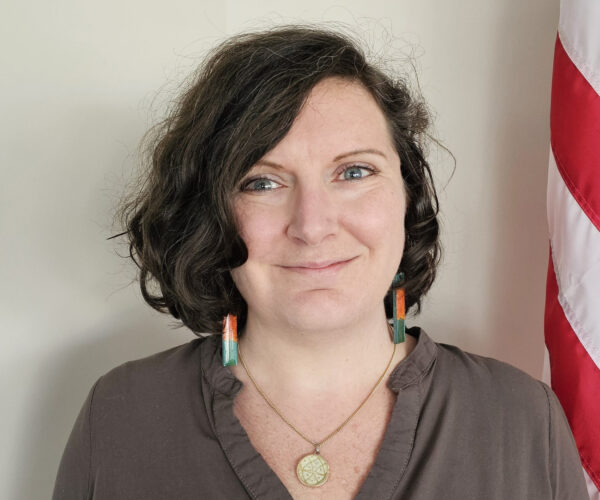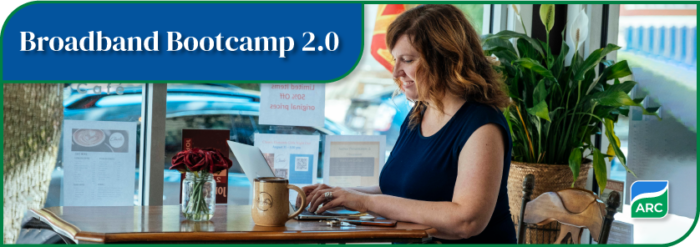Jordan Pittman of the Institute of Local Self-Reliance (ILSR) and Alex Kelley of the Center of Rural Innovation (CORI) are joined by Christopher Mitchell, also of the ILSR, in the third installation of ARC’s Broadband Bootcamp 2.0, “Navigating Broadband for Communities with Differing Resources and Capacities”.
Jordan takes on a new role as moderator in this session, leading a robust discussion on how communities with limited resources can increase their capacity, calibrate broadband opportunities to match local capabilities and interest, and embark on ambitious yet achievable strategic planning designs despite working against the odds. Session attendees will come away knowing how to take initiative and improve the current state of broadband in their communities.
Meet the presenters:


Alex Kelley
Alex Kelley is the Director of Broadband Consulting at the Center on Rural Innovation. His team
specializes in helping rural communities get funding to close their broadband gaps, and build public
private partnerships that result in world class, affordable, community-driven networks.


Christopher Mitchell
Christopher Mitchell is the Director of the Community Broadband Networks Initiative with the Institute for Local Self-Reliance (ILSR) in Minneapolis. Mitchell is a leading national expert on community networks, Internet access, and local broadband policies.
Mitchell built CommunityNets.org, the comprehensive online clearinghouse of information about local government policies to improve Internet access. Its interactive community broadband network map tracks more than 600 such networks. He also hosts audio and video shows online, including Community Broadband Bits, Building for Digital Equity, and Connect This!
With Matthew Rantanen and many others who generously shared their time and expertise, Christopher Mitchell co-founded the Tribal Broadband Bootcamp events that have worked with people from more than 65 Tribes across North America and well over 300 participants since 2021.
Public Knowledge presented Christopher with its Internet Protocol award in 2021, which honors those who have made significant contributions to Internet policy. In 2019, the Coalition for Local Internet Choice gave Mitchell its “Indispensable” Award and the Blandin Foundation of Minnesota presented him with a “Courageous Leadership” award. In 2015, the White House used Mitchell’s research as building blocks in a National Economic Council report encouraging community networks. He was honored as one of the 2012 Top 25 in Public Sector Technology by Government Technology, which honors the top “Doers, Drivers, and Dreamers” in the nation each year. Christopher helped to found Next Century Cities and served as Director of Policy for its first five years.
He tweets @communitynets and is on Mastodon at @communitynets@fosstodon.org
He earned a Master’s degree in Public Policy from the Hubert Humphrey Institute of Public Affairs at the University of Minnesota and a Bachelor’s degree in Political Science from Macalester College.
He is also a professional sports photographer, shooting regularly for the University of Minnesota’s Golden Gophers and other clients in Minnesota. He has also worked as a server administrator, web geek, and in automated quality assurance for software.


Elizabeth Sanner
Elizabeth is a multidisciplinary data, geospatial, and broadband analyst, whose extensive academic background spans geography, environmental policy and justice, and political science. She holds a Master’s Degree in GIS/Geography from the University of Kansas. Throughout her career, Elizabeth has applied her diverse expertise within the broadband sector, starting as a network designer for a Fiber-to-the-Home (FTTH) consulting firm. She has played a pivotal role in advocating for and supporting rural electric cooperatives across the United States in their development of FTTH networks.
Elizabeth’s professional career has also included serving as a Grant and Funding Data Manager, where she addressed issues of digital inequality and technological disparities, particularly in traditionally marginalized communities. Currently, as the Broadband Program Manager at the Appalachian Regional Commission (ARC), she continues this work, advising on, guiding, and solving strategic challenges to enhance broadband connectivity throughout the Appalachian region. Her role emphasizes leveraging her geospatial and analytical skills to direct improvements in broadband infrastructure and advocate for equitable access.
Elizabeth is an accomplished analyst with a multidisciplinary background in data, geospatial analysis, and broadband technologies. Her educational foundation includes a Master’s Degree in GIS/Geography from the University of Kansas, supplemented by studies in geography, environmental policy and justice, and political science. Elizabeth’s career has been marked by significant contributions to the broadband sector, beginning with her role as a network designer for a Fiber-to-the-Home (FTTH) consultancy.
She has been instrumental in supporting and advocating for rural electric cooperatives across the United States, assisting them in deploying their own FTTH networks. Her commitment to addressing digital inequality has led her to focus on technological disparities affecting traditionally marginalized communities. In her position as a Grant and Funding Data Manager, Elizabeth further honed her expertise in managing data-driven projects aimed at enhancing digital access.
Currently, as the Broadband Program Manager at the Appalachian Regional Commission (ARC), Elizabeth strategically guides efforts to improve broadband connectivity across the Appalachian region. Her role involves advising on policy, guiding development initiatives, and providing expert problem-solving to enhance infrastructure and promote equitable broadband access. Her work is crucial in shaping the future of broadband in one of the most diverse and challenging landscapes in the United States.


Jordan Pittman
Jordan Pittman is a Digital Equity Coordinator with ILSR’s Community Broadband Networks Initiative. He supports the team’s work in promoting access to affordable, high-quality broadband service for all, with a focus on those who face systemic barriers to digital equity. Jordan received a B.S. in Rural Community Development from Abraham Baldwin Agricultural College and has been interested in ways that public policies affect rural places and structured access to resources.
